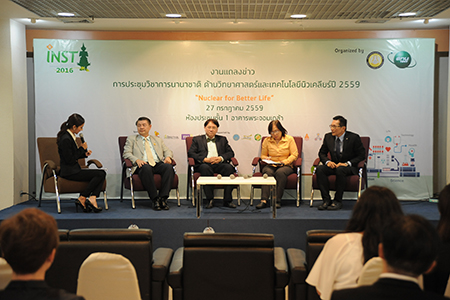Nuclear Technology as Thailand’s Driving Force

Nuclear technology has received warm welcome from many countries, which have applied it for development purposes. In Thailand, scientific studies and nuclear-technology development have been extensive. To entrepreneurs in both industrial and medical fields, nuclear technology proves a great alternative. It, after all, can increase the value of various products for not just domestic but also overseas markets.
Nuclear exceeds all expectations in terms of benefits. It is useful in medical, healthcare, agricultural, industrial, environmental and food fields. Several countries across the world have accorded much importance to nuclear researches paving way for them to successfully develop nuclear technology. Among them are Brazil, Chile, Denmark, South Korea, Vietnam, the Philippines and Thailand.
Thailand, the Philippines, and Vietnam are the three ASEAN nations that win Nuclear Industry Summit Awards. The awards have been granted in recognition of their ability to prevent the leak of radioactive substances and of their nuclear-technology development. Thailand has conducted various nuclear researches for its future. These researches can be used for the development in the following fields:
Medicine: Nuclear technology facilitates radiation, diagnostic radiology, nuclear medicine, X-ray, and many other procedures used in diagnosing symptoms and providing medical services. Radiotherapy and nuclear medicine can cure both tumors and cancers. Cobalt 60 is used in cancer treatments, gold-198 in skin-cancer therapy, and tantalum-182 wires in cervical-cancer cure. Radiation, moreover, helps sterilize medical equipment.
Agriculture: Irradiation services have been active in the field for more than 25 years already, and with immense successes. Radiation breeding improves plants. Cobalt-60 radiation, for example, can enhance the characteristics of many varieties and increase the value of crops such as the jasmine rice Khao Dawk Mali 105. Thanks to radiation treatment, yellow lotuses from the United States can grow in Thailand making the country the first in Southeast Asia to be able to host this floral plant. Radiation, moreover, is widely used to sterilize insects for pest-control reasons. When it comes to food preservation, irradiation works well for spices, herbs, seafood, fermented meat, mango, longan, rambutan, lychee, pineapple, mangosteen and dragon fruit. Food irradiation is an export standard as countries like the United States, Australia and New Zealand use it for food safety.
Industries: Because nuclear technology boosts productivity, facilitates quality control and lowers production cost, its use has become more widespread in Thai industries. Radiation now helps with the production of synthetic thread, increases the heat resistance of insulators, and supports the manufacturing of hydrogel bandage for quicker wound healing. Neutron rays are efficient tools for the exploration of underground oil too. Among the highlights in the industrial sector is gemstone irradiation. When irradiated by high-energy electron accelerators, crystal topaz can turn "Sky Blue" and even "Swiss Blue". As its color changes, its value significantly jumps. Each year, high-energy electron accelerators can treat up to 4,800 kilograms or 24 million carats of gemstones.
Education: Studies have been conducted to check radioactive levels, such as uranium level, in natural areas just as isotope technology works great in determining the rate of groundwater flow and surveying groundwater sources. Radiation, moreover, contributes to wastewater treatment, organic-fertilizer production, farmland development, forestry and hydrological activities. To ensure Thailand’s nuclear development roars ahead, Thai researchers have received grants to further their study overseas. They are expected to return to their homeland and put their knowledge to good use.
In all, nuclear technology has emerged as an alternative for new-generation entrepreneurs. It also promises to be a key tool for Thailand’s further development if various sectors agree to join forces in driving the country ahead on a sustainable basis through nuclear innovations. To make this thing happen, the government and private sectors along with relevant agencies both in Thailand and beyond must support nuclear technology.
Nuclear technology won’t seem irrelevant to Thais’ lives anymore. The Thailand Institute of Nuclear Technology (public organization) has now given Thai youth opportunities to show off their talent at the robot contest 2016 whereby their robot inventions will engage in nuclear technology. In conjunction with the contest, the International Nuclear Science and Technology Conference will also take place at the Centara Grand at Central Plaza Ladprao between 4 and 6 August 2016. This important forum will bring together more than 500 nuclear specialists and researchers from around the world. Outstanding academics and researchers are scheduled to make 133 oral or poster presentations during the event. They are hailed from China, India, Indonesia, Iran, Japan, South Korea, Malaysia, Myanmar, South Africa, Sweden and various other nations. Thailand will also use this forum in showcasing its remarkable nuclear technology.
Published by : Naruemol Rattanasuwarna
Public Relations, Office of the Permanent Secretary
The Ministry of Science and Technology (MOST)
Tel : 02 333 3727 Ext. 3732








